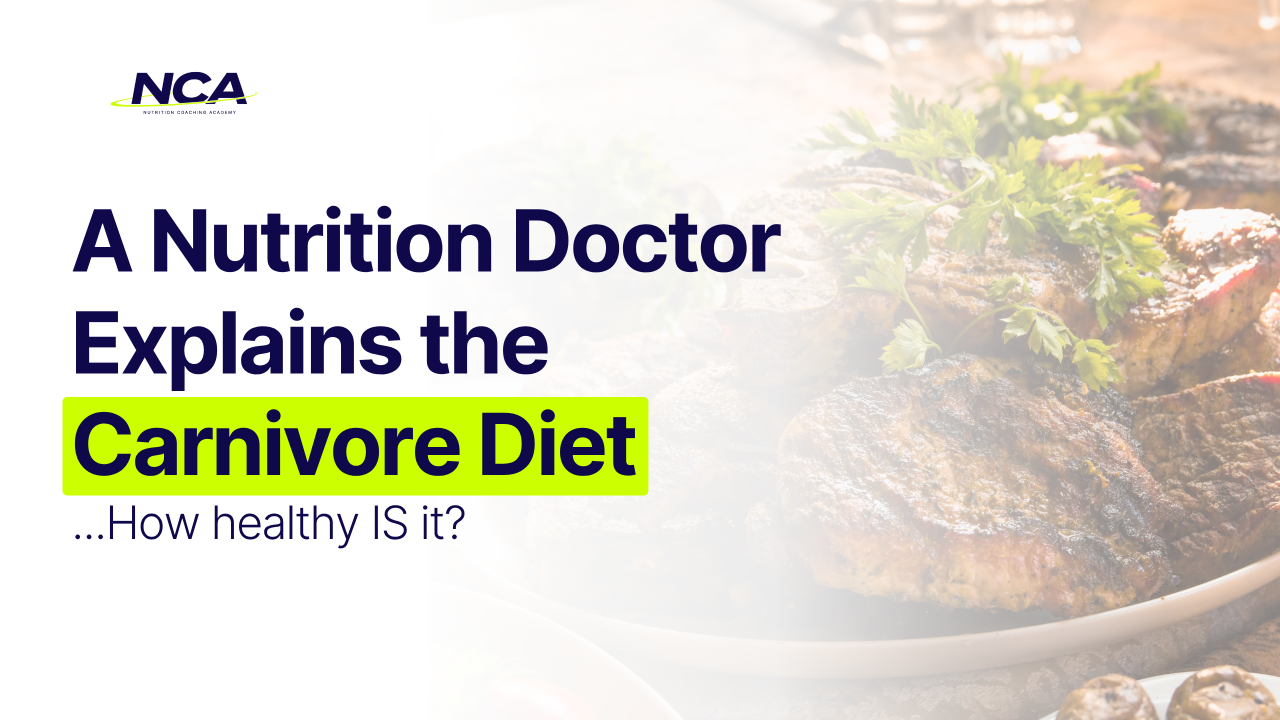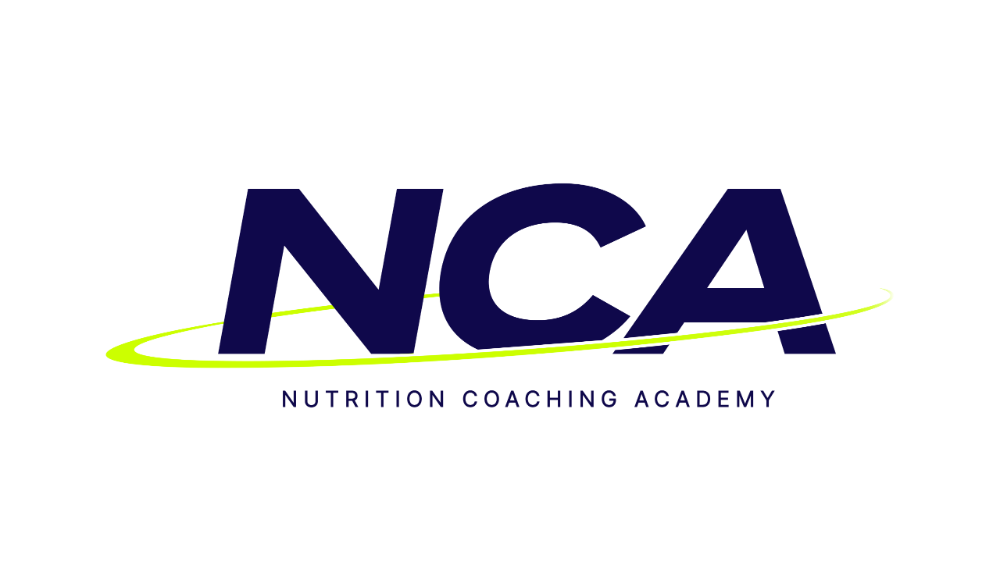A Nutrition Doctor Explains the Carnivore Diet
May 28, 2025
Protein is, without a doubt, the most important thing we can consume, but does that mean it’s the only thing we should eat?
I'm Dr. Marc Morris, and today I’m going to teach you what you need to know about the Carnivore Diet.
For starters, when you think of the word carnivore, what do you think? Probably a meat-eater, right? Meaning eating meat and, therefore, protein.
The word protein is actually derived from the Greek word “proteos,” meaning primary. It’s the first thing we build meals around. It’s very important for anyone looking to improve their body composition or athletic performance.
Therefore, it’s really important in the world of nutrition coaching, but does that mean that’s all we should eat? Probably not, and today I’m going to teach you why.
Let’s break down the “Carnivore Diet” and what it means for you and your nutrition clients.
Overview of the Carnivore Diet

The Carnivore Diet focuses on eating meat and animal products only. Since the carnivore diet is meat-centric and eliminates all plant foods, like fruits, vegetables, grains, nuts, and seeds, it ends up being very low-carbohydrate with higher amounts of fat and protein. Also, the thought is that by limiting your intake to meat and animal-derived foods, and nothing else, you limit your exposure to things like bad fats, glyphosate, artificial hormones, and antibiotics. Which, as we’ll talk about today, may or may not be true or even impact your health.
What could be some of the benefits of following the Carnivore Diet?
One proposed benefit of the carnivore diet, and a reason why people may be inclined to choose this diet, is weight loss. Both the restrictive nature of the diet and the satiating aspects of increased protein can contribute to a reduction in overall caloric intake. Which, as you know, is important for weight loss.
The carnivore diet also boasts being gut-friendly. Since meat is mainly protein and fat and is low in fiber, most of its digestion occurs before the lower digestive tract. For those with Irritable Bowel Syndrome or Inflammatory Disease experiencing symptoms, the carnivore diet may be of benefit.
Want to Learn More?
Watch the full video to learn about the BEST high-protein foods for a calorie deficit!
Nose-to-Tail and Organ Meat
An extension of the carnivore diet is the idea of nose-to-tail eating. It is the notion of consuming the complete animal. For example, many people are used to eating the muscle component of animals such as ribeye steak, pork belly, chicken wings, etc., but there is much more we could eat and see health benefits.
However, nose-to-tail eating includes more unfamiliar parts of the animal, such as beef heart, tongue, and liver. But not just organ meat as well, we’re talking about chicken feet, tendons, cartilage, etc.
Supporters of nose-to-tail eating point out that our ancestors have always eaten this way and therefore argue that we should continue to do so. Supporters also argue that it is a more sustainable eating practice. Eating nose to tail can involve less waste compared to eating the muscle cuts of animals solely.
What are some other benefits?
Another proposed benefit of nose-to-tail eating is that it can provide complete nutrition compared to eating only muscle meat. Additional micronutrients that aren’t typically found elsewhere, like vitamin B12, choline, and vitamin K2, are found in high levels in organ meats. Fans of the diet are against the idea that eating only muscle meat can result in an amino acid imbalance. Remember, protein is made up of amino acids. Some essential, some non-essential.
Ravenous nose-to-tail fans explain that muscle meat is rich in the amino acid methionine, which is an essential amino acid, meaning we need to consume it, which may deplete glycine, a non-essential amino acid.
The hypothesis is that this shift increases homocysteine, which can lead to cardiovascular issues. So, supporters of nose-to-tail eating point out that collagen in animal connective tissues and bones contains more glycine, and thus could influence this shift.
For the record, this theory has never made its way into practice or peer-reviewed research, and thus no reputable sources are touting it as a way to decrease cardiovascular risk. This is an interesting theory, and we may learn more, but I wouldn't go out of my way to eat organ meat for this reason alone.
Controversy and The Liver King

Like anything else, it's not a bad idea to vary and rotate your protein sources, and if you enjoy eating nose-to-tail, it may be beneficial to your health and contribute to less food waste. However, people often take this way of thinking to extremes. A more extreme version of the carnivore diet is the idea that humans should consume raw meat. This controversial idea stems from TikTok star and supplement company owner, “Liver King” Brian Johnson.
He promotes 9 ancestral tenets, one of which is centered around eating. The “Liver King” supposedly eats a pound of liver every day and promotes it as the most nutrient-dense meat that will help build muscle.
You don’t need to do this. Please don’t do this.
This is all a part of Liver King's message to ditch modern living and revert to ancestral living to become the most dominant and healthful version of yourself.
One of Liver King's beliefs is that eating organs will strengthen our organs.
You can often see him eating bull testicles because he believes it is the best way to support the health of your testicles.
Unfortunately, this is a blatant example of the dangers of social media. Nothing he is touting or promoting is actually true. An issue with eating raw, uncooked meat is that it can contain harmful bacteria and parasites that can make us very ill. So please proceed with caution or talk to your doctor before doing any of this stuff.
Eating liver in excessive amounts can also be dangerous due to the high levels of vitamin A that can lead to toxicity concerns.
Benefits of Consuming Animal Protein Sources
Now, back to reality for a second.
One thing that is worth highlighting for anyone trying to improve their nutrition, body composition, and overall health is the benefits of eating meat. Often, we hear that animal proteins are “complete” sources of protein. What does this mean?
Consuming protein provides us with the amino acids our body needs. Many foods derived from animal products are “complete” protein sources, meaning they can provide us with all of the essential amino acids. There are some amino acids that we cannot produce in our bodies, and those are known as essential amino acids.
Some protein sources are considered “incomplete” because they lack one or more essential amino acids. Typically, this includes plant-based protein sources such as fruits, vegetables, grains, etc.
What does the research say about these protein sources?
There have been a few large population studies investigating protein intake and sarcopenia in adults.
These studies compared outcomes such as the preservation of muscle mass. Animal-based protein sources demonstrated a stronger ability to stimulate protein synthesis. A systematic review comparing animal and plant-based sources of protein and their influence on lean muscle mass found that animal protein showed a stronger effect on lean body mass.
One way to assess the protein quality of a food source is the Protein Digestibility-Corrected Amino Acid Score (PDCAAS). PDCAAS is a method to evaluate protein quality in a food source. A score is determined based on the amino acid makeup of the protein and its digestibility.
As previously discussed, animal protein is more complete. Animal-based protein sources have been shown to have higher digestibility than plant protein sources, so they routinely score higher on quality. So as you can see, the inclusion of animal-based protein sources is important to get enough quality protein, which can improve our health. Obviously, this is important for nutrition coaches, as most of our clients want to get leaner or improve athletic performance.
But again, does this mean it should be the only thing we’re eating? By excluding plant foods, you may be missing out on many benefits.
Let’s talk about those.
1. Fiber

Plant foods such as fruits, vegetables, and legumes contain dietary fiber. Fiber is an important part of a healthy diet because it helps maintain regular bowel movements and regulate blood sugar levels. There is growing evidence to support that gut health is important. It can be linked to many other aspects of health, such as chronic diseases, our immune systems, and mental health. Since fiber is what the bacteria in our gut use for energy.
Evidence shows that those who regularly consume adequate fiber and varying sources of plant foods in their diet have increased diversity in their gut microbiome. Now, anecdotally, the people I know who eat this way have no problems with bowel movements or regularity, but the opinion of a few doesn’t make the rule.
So eat your fiber.
2. Vitamins and Minerals
Fruits and vegetables provide a variety of essential vitamins and minerals. A diet rich in fruits and vegetables has been shown to be correlated with a lower risk of chronic diseases such as cardiovascular disease and protection against certain types of cancer. It could be because of the vitamins and minerals.
3. Antioxidants
Many fruits and vegetables contain powerful substances known as antioxidants. These substances are protective of cell damage that occurs from everyday regular cellular processes, like digesting and metabolizing food. Some antioxidants naturally occur in meat; however, the majority of antioxidants are found in fruits and vegetables.
So we must eat them.
Real Deal on the Carnivore Diet
Here’s the deal:
After studying the field of nutrition, which has limitations, over the last 20 years, I’ve come to this conclusion. Eating fruits and vegetables, for most people, is one of the best things they can do for their health. I can say that with certainty.
Additionally, after assessing the diets of nearly 5,000 people, most weren’t eating nearly enough protein, and animal-based protein sources are one part of the solution. Stop chasing the thing that someone is selling you as a game-changer and start consistently doing the things we know, based on science, that help right now.
This means eating meat, but also eating plant-based foods, in the right proportions, based on your goals and your individual requirements and needs. That’s where the magic happens.
If you or your clients want to do the carnivore diet, I don’t see why you can’t try it, but for most, this isn’t the path to optimal, sustainable health.
Final Thoughts
The Carnivore Diet has sparked a lot of curiosity, and while it may offer some benefits for certain individuals, it's not a one-size-fits-all solution. Animal protein plays an important role in building muscle and improving health, but eliminating plant foods means missing out on essential fiber, micronutrients, and antioxidants that support long-term health.
As with most things in nutrition, balance and personalization are key. Don’t get caught up in extremes or trends. Focus on what works for you, what’s sustainable, and what’s backed by science. A well-rounded diet that includes both animal and plant-based foods is still the best approach for most people.


